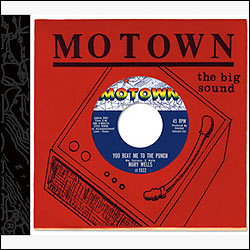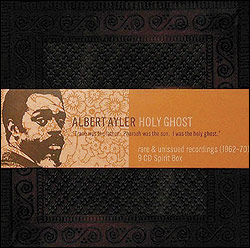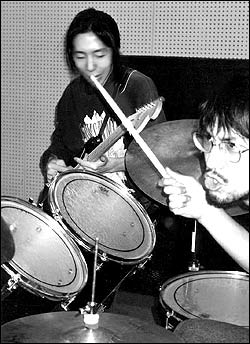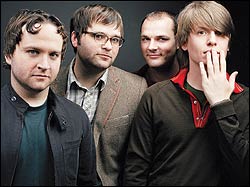If The Complete Motown Singles, Vol. 2: 1962 (Hip-O Select) were a pile of the original 50-odd 7-inch singles it collects, it’d be an impossibly cool artifact. As it is, it’s a pretty neat idea—the second boxed set in Hip-O Select’s limited edition, mail-order-only series of reissues of every single Motown released from 1959 to 1972, four CDs and an 88-page book, bound into an “album” slightly larger than the size of a single. And, just for that frisson of the Genuine Artifact, there’s a facsimile 45 of Mary Wells’ No. 1 R&B hit “You Beat Me to the Punch” slipped into the front cover, with the original label design: cryptic matrix numbers, a “Produced by Smokey” over on one side that doesn’t suggest that “Smokey” is the same person as the “Wm. Robinson” co-credited with writing the song, a note saying “Vocal Accompaniment Love – Tones.”
It’s hard to get away from the package’s suggestion that a lot of what was interesting about the songs on 1962 was their presence as actual, physical records—that they were meant to be heard one or two at a time, and to compete one or two at a time with the other records in their category. Before Motown was an unstoppable machine, it was just another ambitious but struggling independent R&B label; and in 1962 it was still spinning off sublabels to hit the gospel and jazz niche markets, withdrawing singles to substitute alternate mixes that might sound a little better on jukeboxes, and making occasional chart breakthroughs. (This was in the long-gone days when an independent label could still score national hits, but that’s a whole other story.) As with the first volume of The Complete Motown Singles, the hits mostly leap out at you—the market was very good at figuring out what the best Motown songs were—but some of the most fascinating recordings here are the near misses and wild swings.
The label’s founder, Berry Gordy, had a great ear for first-rate songs and performers, and apparently about seven great ears for fifth-rate ones. In 1962, Motown released enormous hits by the Miracles (“You Really Got a Hold on Me,” originally tucked away on the B-side of the forgettable “Happy Landing”), the Marvelettes (“Beechwood 4-5789,” which is unnervingly sexy even 43 years later), and the Contours (“Do You Love Me”). They also released a bunch of ridiculous flops: husband-and-wife team Hank & Carol Diamond doing a vocal version of the theme from Exodus; Gordy’s younger brother, Bob Kayli, struggling through “Hold on Pearl” (a novelty comedy number about drowning while attempting to rescue his girlfriend); a single by the white Detroit rock and roll band Mike & the Modifiers (who were known for improvising songs in response to audience suggestions). As a marketing experiment, Gordy asked the Temptations to rename themselves the Pirates (and . . . maybe dress up in pirate outfits a little bit) for a single, “Mind Over Matter,” which fortunately went nowhere. All through 1962, he continued to throw good money after bad, supporting artists who didn’t look like they’d ever get a hit, particularly a commercial lead brick of a trio called the Supremes.
What kept Motown ticking was that it was also a community based around a single Detroit building. Motown artists hung out at the office, watched each other’s kids, wrote songs for each other, dated each other on the sly. It was the kind of place where Ronnie White from the Miracles could tell Berry Gordy about this amazing blind 11-year-old who lived near him, and a few months later they’d press a flop called “I Call It Pretty Music but the Old People Call It the Blues” by Little Stevie Wonder, and keep working with him until people finally started paying attention. The first Martha & the Vandellas single, “I’ll Have to Let Him Go,” happened because they needed a singer in the studio while a musicians’ union representative was present, so they called in Motown secretary Martha Reeves.
The communitarian structure of Motown also led to lots of not-so-hot records made by friends and family, although Gordy was serious enough about quality control that almost everything on 1962 has something going for it. But it also meant that there gradually came to be a “Motown sound”—especially after 1962’s monthlong revue-style bus tour across America, Motown’s name itself was a selling point—and that the label’s artists could take their time figuring out what they were best at. A few in particular hit their groove in the course of 1962: Eddie Holland and Lamont Dozier, both floundering solo singers, begin writing songs with Eddie’s brother Brian (by the end of the year, Holland/Dozier/Holland start to sound like the unstoppable hit squad they became), and Marvin Gaye, who starts the year hoping to be a sophisticated jazz vocalist (and attempting to deliver a cover of the Chordettes’ “Mr. Sandman” with a little dignified swing), ends it an R&B star, sticking his thumb out for “Hitch Hike.” There’s no organization quite like early Motown in pop music any more, and the end of the single as a quick-and-dirty way to try something new means there may never be again. Which makes 1962‘s evocation of those cheap, mysterious pieces of vinyl even more precious.
The Complete Motown Singles, Vol. 2: 1962 can be ordered on www.hip-oselect.com.








